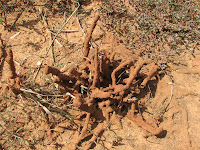Got Mites???

If you are experiencing some mystery bites, you are not alone. Right now it seems that more and more people than usual are calling the Extension office wondering what could be biting them in their home. There are several types of insects that may bites humans: mosquitoes, fleas, chiggers, lice and some types of mites. None of them, however, will live inside or under your skin or in the body.
I have had several positive identifications for mites now that the weather has started to warm up. After some sleuth work, I have deduced that these mites are probably the Tropical Rat Mite. The tropical rat mite is the most common indoor infesting mite, and are found where rodents infest indoors. If you have a rodent infestation, and are experiences small welts or bites on the body, you probably have tropical rat mites.
Another type of mite that will bite humans are fowl mites, which live where birds are found and prefer to feed on birds.
It is very likely that the reason for this sudden increase in tropical rat mites biting humans is because of the weather change. Many rodents move indoors during the colder months to nest. Now that it is getting warmer and the rodents are moving back outdoors to burrow. When they leave their nest, the mites no longer have their host, and bite the next best thing - YOU!
If you can remove rodent or bird nests inside or very near the structure, the problem should go away on its own. If you never get rid of the rodents or birds, the problem will remain. Look around the attic and outdoors for signs of rodent infestations. Make sure you remove all nesting materials and/or treat the nest area. Products that contain the active ingredient, bifenthrin, are helpful against mites. Be sure to only treat the areas where mites are found. Read the directions and do not apply to beds, couches, or food handeling areas unless stated on thh label.It is easy to get carried away once you have identified the problem as mite. Many people will let their imagination get the best of them and even after the mites are gone, still continue to experience bites. Do not overuse pesticides, which can lead to sensitivity of the skin and will make you think you are being bitten when you are not. These mites DO NOT complete their lifecycle on humans. You may find them on your skin, but they DO NOT live on you. Get rid of the source (birds or rodents) to get rid of the mites.


Comments